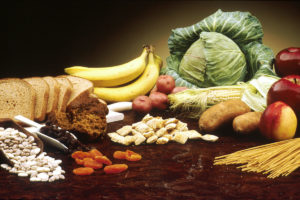 Once again a study found health benefits from eating a diet rich in plant-based foods, such as vegetables, fruits, whole grains, legumes, beans, nuts, and seeds This time the health benefit was a lower incidence of stroke.
Once again a study found health benefits from eating a diet rich in plant-based foods, such as vegetables, fruits, whole grains, legumes, beans, nuts, and seeds This time the health benefit was a lower incidence of stroke.
Researchers from the Harvard T. H. Chan School of Public Health looked at the data from two large studies and found that a diet high in quality plant-based foods may reduce the risk of having a stroke by about 10%. The lower risk was for ischemic stroke, in which a blood clot blocks artery to brain. There was no difference in risk for hemorrhagic stroke.
Interestingly, researchers found no association between a vegetarian diet and risk of stroke, but the number of cases was small.
From Medical Xpress: Diet high in healthful plant-based food may reduce risk of stroke by 10%
Eating a healthy, plant-based diet that includes foods like vegetables, whole grains and beans, and decreasing intakes of less healthy foods like refined grains or added sugars may reduce your risk of having a stroke by up to 10%, according to a study published in the March 10, 2021, online issue of Neurology, the medical journal of the American Academy of Neurology. The study found a diet high in quality plant-based foods may reduce your risk of having an ischemic stroke.
An ischemic stroke is associated with a blockage of blood flow to the brain and is the most common type of stroke. The study found no link between the diet and hemorrhagic stroke, which happens when an artery in the brain leaks blood or ruptures.
The study involved 209,508 people who did not have cardiovascular disease or cancer at the start of the study. Researchers followed the participants for more than 25 years. Every two to four years, participants completed a questionnaire that asked how often, on average, they ate more than 110 foods over the previous year.
Researchers divided the participants into five groups based on the quality of their diet, specifically, higher amounts of plant-based foods, without excluding all animal foods.
For example, people with the highest healthy plant-based diets had, on average, 12 servings of healthy plant-based foods like leafy greens, fruits, whole grains, beans and vegetable oils per day, compared to those with the lowest quality diets, who averaged seven and a half servings per day. When it came to less healthy plant-based foods, such as refined grains and vegetables with high glycemic indexes like corn and potatoes, the people with the healthiest diet had, on average, three servings per day compared to six and a half servings for those with the lowest quality diets. As for meat and dairy, the group with the healthiest diet averaged three and a half servings per day, compared to six servings per day for those with the lowest quality diets.
Compared to people who ate the fewest healthful plant-based foods, people who ate the most had a 10% lower risk of having a stroke.
When looking at type of stroke, compared to people who ate the fewest healthful plant-based foods, people in the group who ate the most showed about an 8% lower risk for ischemic stroke. Researchers found no difference in risk for hemorrhagic stroke.
A limitation of the study is that all the participants were health professionals and were predominantly white people, which means the results may not apply to the general population.
